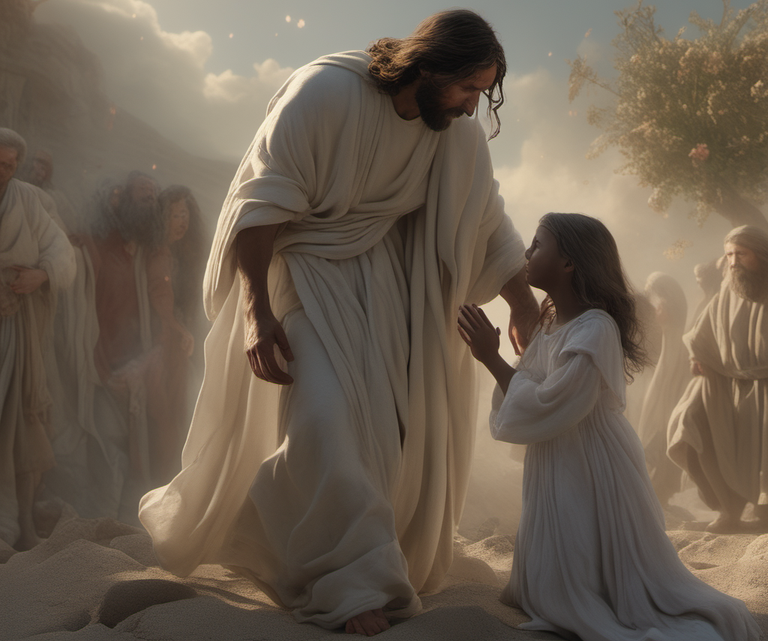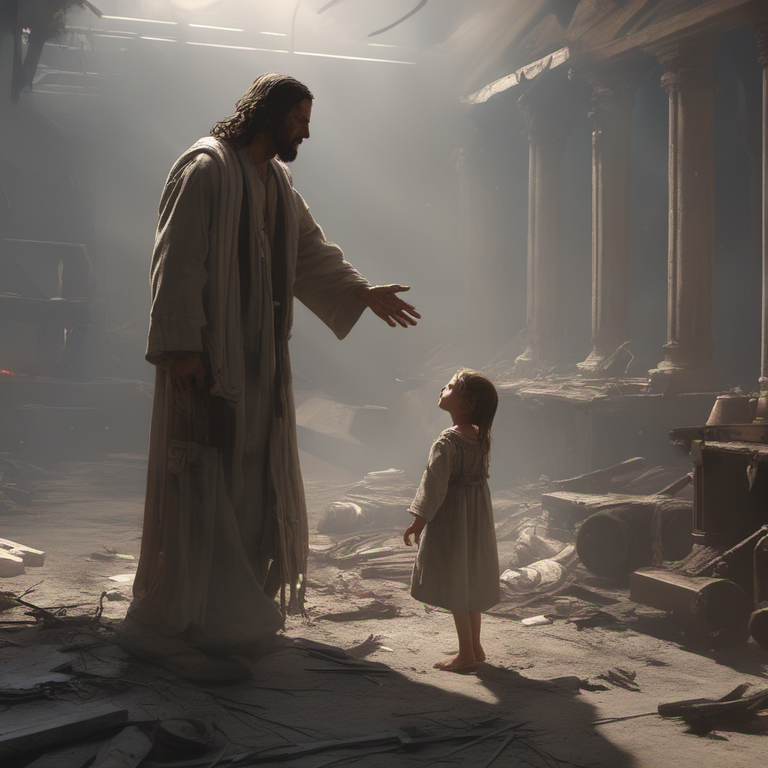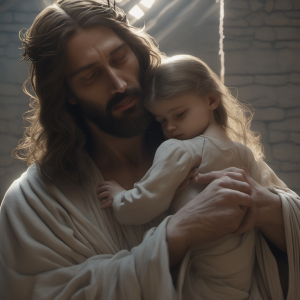The Fall Feasts, Baptism, and the Sole Authority of Yehovah in Forgiveness: A Scriptural Guide to Emotional and Spiritual Liberation


Introduction
As the Fall Feasts draw near, it is a time of spiritual reflection and renewal for believers. The upcoming sacred days offer a unique opportunity to delve into the depths of our faith, guided by the Torah and other Scriptural texts. Central to this period is Yehovah’s incomparable sacrifice: His only son, Yeshua. This divine act is not just a historical or theological point; it directly affects how we should approach repentance, baptism, and, most importantly, forgiveness. This post seeks to clarify who genuinely has the authority to forgive sins and liberate us spiritually.
The Ultimate Sacrifice, Baptism, and the Fall Feasts
The sacrifice of Yeshua is the cornerstone of our faith. This selfless act of love provides humanity a pathway to Yehovah, marked by repentance and baptism. Acts 2:38 clearly states that we must “Repent and be baptized, every one of you, in the name of Jesus Christ for the forgiveness of your sins.” This scripture encapsulates the symbiotic relationship between repentance and baptism; the latter is a public affirmation of the former. The Fall Feasts bring these concepts into acute focus, reinforcing the idea that atonement and forgiveness are direct exchanges between humanity and Yehovah, facilitated by Yeshua.
Baptism: The First Step Toward a New Life
In Mark 16:16, we are told, “Whoever believes and is baptized will be saved, but whoever does not believe will be condemned.” Baptism is more than a ceremonial act; it’s a transformative experience symbolizing the death of the old self and the rebirth of the new, sanctified individual. Furthermore, it is a testament to our faith and a declaration to the world that we accept Yehovah’s authority and Yeshua’s role as our mediator and savior.
The Dangers of Misplaced Intermediaries: Why Bishops and Priests Cannot Forgive Sins
The belief that bishops, priests, or any human intermediaries have the divine power to forgive sins is a dangerous and unbiblical misconception. Matthew 9:6 explicitly says, “But I want you to know that the Son of Man has authority on earth to forgive sins.” Only Yeshua possesses this divine authority, a truth reiterated in 1 Timothy 2:5: “For there is one God and one mediator between God and mankind, the man Christ Jesus.” The ramifications of this misunderstanding are severe, particularly among vulnerable populations like children, who may feel compelled to confess deeply personal or even sexual sins to human authorities. This practice not only violates Scriptural teachings but can also lead to emotional trauma, exploitation, and a cascade of mental health issues.
Yehovah as the Sole Arbiter of Forgiveness
Scripture is unequivocal about Yehovah’s exclusive role in the process of forgiveness. As 1 John 2:1 reassures us, “We have an advocate with the Father—Jesus Christ, the Righteous One.” This essential truth liberates us from the need to seek human intermediaries for forgiveness, drawing us closer to Yehovah in a direct and personal manner.
Practical Steps for Confession and Repentance
The Bible offers clear guidance on how we should approach confession and repentance. 1 John 1:9 states, “If we confess our sins, He is faithful and just to forgive us our sins and to cleanse us from all unrighteousness.” These are deeply personal actions that require self-examination, humility, and a sincere desire for change, all guided by the Ruach HaKodesh (Holy Spirit).
The New Testament teaches us that “Everyone who calls on the name of the Lord will be saved” (Romans 10:13). The Fall Feasts are an excellent time to put this into practice. As we observe these sacred days, let us remember that our path to forgiveness, redemption, and ultimately, eternal life, is a direct one, involving Yehovah and Yeshua alone.
The Scapegoat: An Ancient Practice Rooted in Yehovah’s Design
In ancient times, during the annual observance of Yom Kippur, the Day of Atonement, the High Priest would perform an elaborate ceremony involving two goats. One goat was offered as a sin offering to Yehovah, while the other, known as the “scapegoat,” was set free into the wilderness after the High Priest had laid hands on it, symbolically transferring the sins of the people onto the animal (Leviticus 16:7-10).
This practice of transferring sins onto the scapegoat served as a powerful illustration of how the High Priest acted as a mediator between Yehovah and His people. The High Priest’s unique role during this ritual underscored the gravity of sin and the sanctity of the temple, as well as the compassion and mercy of Yehovah, who made provision for the sins of His people to be forgiven.
Yeshua: Our Eternal High Priest
Fast forward to the New Covenant, and we see Yeshua taking up the mantle of the High Priest in a way that transcends any earthly temple service. Hebrews 4:14-16 tells us, “Therefore, since we have a great high priest who has ascended into heaven, Jesus the Son of God, let us hold firmly to the faith we profess… Let us then approach God’s throne of grace with confidence, so that we may receive mercy and find grace to help us in our time of need.”
Yeshua serves as our eternal High Priest, continually interceding for us before Yehovah, fulfilling and superseding the role previously held by earthly High Priests. Just as the High Priest in ancient times acted as a mediator, laying his hands on the scapegoat to transfer the sins of the people, Yeshua became the ultimate sacrificial offering, taking upon Himself our sins so we might be reconciled with Yehovah.
Integrating Ancient Wisdom into Modern Understanding
By understanding the symbolic importance of the scapegoat and the High Priest in the temple rituals, we gain a deeper appreciation for Yeshua’s role as our eternal High Priest and Mediator. This reaffirms the Biblical teaching that forgiveness comes directly from Yehovah, and our relationship with Him is facilitated by our faith in Yeshua.
The Dangers of Misplaced Intermediaries Revisited
Against this backdrop, it becomes even clearer why the idea that human intermediaries like bishops or priests can forgive sins is so dangerous. It not only diverges from Scriptural teachings but also diminishes Yeshua’s unique and all-encompassing role as our eternal High Priest.
The upcoming Fall Feasts offer a reflective period to understand and appreciate Yehovah’s gift of forgiveness, brought to fruition through Yeshua, our eternal High Priest. This sacred time reminds us that Yehovah is the sole authority in matters of sin, judgment, and forgiveness, erasing the need for human intermediaries in the process.

The Psychological Toll of Misplaced Authority: Unburdening the Soul
While Scripture is clear that the power to forgive sins rests solely with Yehovah and Yeshua, the effects of believing otherwise can be profoundly damaging, both emotionally and psychologically. Many believers, especially children, labor under the misconception that their sins can only be forgiven through confession to human religious authorities like bishops or priests. This belief system can place an insurmountable emotional burden on the individual.
The Weight of Unforgiven Sins
Carrying the weight of what feels like “unforgiven” sins can cause emotional distress, anxiety, and even depression. This psychological burden often becomes compounded when individuals believe they have no direct access to divine forgiveness. They may become consumed with guilt, shame, and a sense of unworthiness, which can lead to a host of mental health issues, including suicidal ideation—a tragically high concern, especially among youth in certain communities.
The Humiliation and Exploitation Risk
Discussing personal sins, particularly sexual sins, with a human authority figure adds another layer of emotional trauma. The act of disclosing deeply intimate failings to another person, who lacks the divine authority to actually forgive, can be humiliating and, in some instances, exploitative. This becomes especially problematic when minors are encouraged to discuss sexual sins with adult figures in religious authority, a practice that not only diverges from Scriptural teachings but can lead to exploitation and abuse.
Finding Liberation in True Forgiveness
Scripture provides a path to liberation from this emotional and psychological burden. Hebrews 7:25 reassures us: “Therefore he [Yeshua] is able to save completely those who come to God through him, because he always lives to intercede for them.” There is immense psychological relief in understanding and accepting that forgiveness is a deeply personal experience between the individual and Yehovah, facilitated by Yeshua, our eternal High Priest and Mediator. We can unload our burdens directly at the feet of the One who has the actual power to forgive and liberate us, offering true peace of mind and emotional healing.
Yehovah, in His infinite wisdom, provided us Yeshua as our eternal High Priest. He is the only mediator required for our sins to be forgiven, a truth that not only aligns with Scripture but also protects us from the emotional and psychological toll that misunderstanding this critical spiritual concept can take.
The Timeless Call for Repentance: Echoing Through Millennia
The message of repentance is woven through the very fabric of Scripture, from the earliest texts to the concluding chapters of the New Covenant. Before the Mosaic Law, even before temples and priests, the call to turn from wickedness and return to Yehovah was clear. It is this basic yet profound principle that remains a central tenet in the belief system of those who seek Yehovah.
A Call As Old As Time
Genesis already gives us a glimpse of the importance of repentance. When Cain’s offering is not accepted by Yehovah, he is warned about the sin that desires to overtake him but is also told he must “rule over it” (Genesis 4:7). This is an early cry for repentance—a call to turn away from sin and choose righteousness.
Repentance in the Prophets
The prophets also relentlessly called for repentance. Isaiah declares, “Wash yourselves, make yourselves clean; Remove the evil of your deeds from My sight. Cease to do evil” (Isaiah 1:16). Jeremiah cries out, “Return, O faithless sons, I will heal your faithlessness” (Jeremiah 3:22). These are not merely Old Covenant admonitions but timeless truths echoed throughout history.
Yeshua’s Message: A Return to the Basics
It is no coincidence that Yeshua’s own ministry began with a call to repentance: “Repent, for the kingdom of heaven has come near” (Matthew 4:17). Yeshua’s message was a return to this fundamental concept, reinforcing the idea that repentance was a prerequisite for entering the Kingdom of Yehovah. The significance of this is magnified when we consider that Yeshua, our eternal High Priest, serves as the mediator for this repentance, bridging the gap between us and Yehovah.
The Psychology of Repentance
Understanding the age-old call for repentance can relieve the psychological burdens associated with sin. The awareness that Yehovah, who has been consistent in His call for repentance since the dawn of humanity, eagerly waits for us to return to Him, provides solace. This shifts the focus from human intermediaries and alleviates unnecessary emotional and psychological suffering. True repentance is not a box to be checked off through a conversation with a bishop or priest. It is a heartfelt turning back to Yehovah, facilitated by Yeshua, which brings genuine emotional and spiritual healing.
The Spiritual Confirmation of Forgiveness: Peace and Calmness
While the psychology of carrying unforgiven sins can be crippling, the opposite is also true. When we earnestly repent and seek Yehovah’s forgiveness through Yeshua, a profound transformation occurs. There is a palpable sense of peace and calmness, a spiritual assurance that signals the lifting of the burden of sin.
The Scriptures Affirm the Inner Peace
The Holy Scriptures attest to this. In Philippians 4:7, it is written: “And the peace of God, which surpasses all understanding, will guard your hearts and your minds in Christ Jesus.” This peace is a confirmation from the Spirit that Yehovah has heard you, has accepted your repentance, and has forgiven your sins.
No Human Intermediary Can Offer This Assurance
It is essential to recognize that this level of spiritual peace and assurance cannot be conferred by any human intermediary like a bishop or a priest. They may offer words of guidance or encouragement, but they cannot provide the deep, spiritual peace that only comes from Yehovah through the mediation of Yeshua.
A Litmus Test for Authentic Repentance
This inner peace serves as a “litmus test” for genuine repentance. If you have repented and yet still feel burdened, it’s an invitation to delve deeper into your spiritual journey, seeking alignment with Yehovah’s will and the teachings of Yeshua. When that alignment is achieved, the Spirit confirms it with a peace that surpasses human understanding, lifting the psychological burden of unforgiven sins.
Conclusion
As the Fall Feasts approach, a time of reflection and repentance, let us be guided by the timeless teachings found in Scripture, focusing on the unique and irreplaceable roles of Yehovah and Yeshua in our lives. Let us seek that spiritual confirmation, a peace that transcends all human understanding, as proof of our authentic connection with Yehovah and the forgiveness of our sins.

